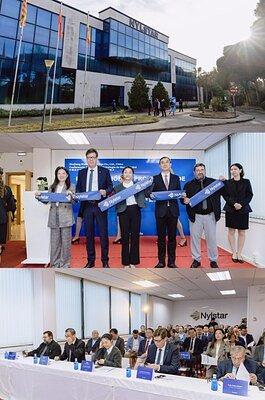
Chinese Firm Revives Spanish Yarn Maker, Signaling Shift in European Textiles
Zhejiang Aixiner’s acquisition of Nylstar aims to blend heritage craftsmanship with sustainable innovation, but raises questions about the future of European textile manufacturing.
Chinese Firm Revives Spanish Yarn Maker, Signaling Shift in European Textiles
Barcelona, Spain – November 13, 2025 – Zhejiang Aixiner Stockings Co., Ltd., a leading Chinese apparel manufacturer, has completed the acquisition of Nylstar, a Spanish nylon yarn producer that faced bankruptcy just last year. The move signals a potential shift in the European textile landscape, blending heritage craftsmanship with a commitment to sustainable innovation. While celebrated by local officials hoping to revitalize the region's manufacturing sector, the acquisition also raises questions about the future of European textile manufacturing in the face of increasing global competition.
Nylstar, based in Girona, Catalonia, had fallen on hard times, filing for bankruptcy in February 2023 after years of financial struggle. A subsequent asset sale in July 2024 saw much of the factory’s equipment dismantled, with only 14 jobs salvaged. The future of the iconic Spanish yarn manufacturer looked bleak until Aixiner stepped in.
“This acquisition represents a strategic opportunity for us to expand our global footprint and enhance our product offerings,” stated a company spokesperson. “Nylstar’s expertise in high-quality nylon yarn and its commitment to innovation align perfectly with our long-term vision.”
A History of Struggle & a Glimmer of Hope
Nylstar’s path to crisis wasn’t sudden. The company had previously navigated restructuring and even a Chapter 11 filing in the US in 2007. Years of economic pressure and increasing competition from Asian manufacturers took their toll. The company's attempts to pivot towards sustainable materials – developing GRS-certified Meryl yarn with recycled content – proved insufficient to overcome its financial challenges.
“It was a tough period for everyone,” said a former Nylstar employee, speaking anonymously. “We saw the company struggle for years, and the bankruptcy was devastating. We hoped someone would come in and save it, but we weren’t sure it would happen.”
Blending Heritage with Innovation
Aixiner's plans for Nylstar go beyond simply reviving production. The company intends to integrate smart manufacturing techniques and sustainability programs into the facility’s operations, preserving Nylstar’s renowned craftsmanship while enhancing its environmental performance.
“The combination of European expertise and Chinese innovation is a powerful one,” says an industry analyst, speaking anonymously. “Nylstar has a long history of producing high-quality yarn, and Aixiner has the resources and technology to modernize the facility and expand its reach.”
The European nylon yarn market, valued at $326.16 million in 2024, is projected to grow, driven by demand from the textile, automotive, and industrial sectors. The market is increasingly focused on sustainability, with a growing demand for recycled and bio-based materials. This aligns with Aixiner’s stated commitment to environmentally responsible manufacturing.
“Consumers are increasingly demanding sustainable products,” says the analyst. “Companies that can meet this demand will have a significant competitive advantage.”
A Shift in the European Textile Landscape?
The acquisition of Nylstar by a Chinese company is part of a broader trend of increasing foreign investment in the European textile industry. While this investment can bring much-needed capital and innovation, it also raises concerns about the long-term future of European manufacturing.
“We are seeing a shift in the global textile landscape,” says a representative from a European textile association, speaking anonymously. “European manufacturers are facing increasing competition from Asian companies, and we need to ensure that we can compete effectively.”
Some fear that the acquisition of Nylstar could lead to job losses or a decline in European manufacturing expertise. Others are more optimistic, arguing that the investment will revitalize the facility and create new opportunities.
“It’s a complex situation,” says the industry analyst. “There are both risks and opportunities. The key will be to ensure that the investment benefits both the company and the local community.”
Aixiner’s plans include retaining skilled workers and investing in new technologies. The company has stated its commitment to preserving Nylstar’s heritage and maintaining its position as a leading producer of high-quality nylon yarn.
“We believe that Nylstar has a bright future,” says the company spokesperson. “We are committed to investing in the facility and its workforce, and we are confident that we can create a sustainable and successful business.”
Looking Ahead
The acquisition of Nylstar represents a significant development in the European textile industry. The move highlights the growing importance of sustainability, innovation, and foreign investment. Whether it will lead to a revitalization of European manufacturing remains to be seen. The future of Nylstar, and the broader European textile landscape, will depend on the ability of companies to adapt to changing market conditions and embrace new opportunities. The next few years will be crucial in determining whether this acquisition marks a turning point for the industry or simply a continuation of existing trends.
Local officials have expressed cautious optimism, hoping that the investment will create jobs and boost the regional economy. The community will be watching closely to see whether Aixiner delivers on its promises and preserves the legacy of this iconic Spanish yarn manufacturer.
